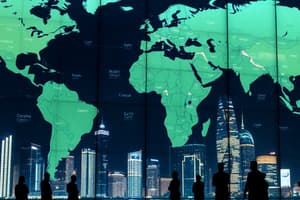Podcast
Questions and Answers
What are the primary actors engaged in international business?
What are the primary actors engaged in international business?
- MNEs and FDI (correct)
- SMEs and local markets
- Governments and NGOs
- Start-ups and private investors
What is the significance of emerging economies in the global market?
What is the significance of emerging economies in the global market?
- They are experiencing above-average economic growth. (correct)
- They rely heavily on foreign aid for development.
- They contribute the majority to global GDP.
- They have strong institutional frameworks that inhibit trade.
What does Gross Domestic Product (GDP) represent?
What does Gross Domestic Product (GDP) represent?
- Total income generated from foreign investments only.
- The sum of international trade activities conducted by a nation.
- Total income generated by a nation's residents abroad.
- The sum of value added by firms, households, and governments operating domestically. (correct)
How does Purchasing Power Parity (PPP) work?
How does Purchasing Power Parity (PPP) work?
What impact does the creation of the common market in the EU have on the definition of home markets?
What impact does the creation of the common market in the EU have on the definition of home markets?
What is the relationship between Gross National Product (GNP) and Gross National Income (GNI)?
What is the relationship between Gross National Product (GNP) and Gross National Income (GNI)?
What primary characteristic defines Multinational Enterprises (MNEs)?
What primary characteristic defines Multinational Enterprises (MNEs)?
Why is understanding international competition increasingly important for businesses?
Why is understanding international competition increasingly important for businesses?
What is the main characteristic of tight cultures?
What is the main characteristic of tight cultures?
What does cultural distance refer to?
What does cultural distance refer to?
Which statement best describes ethical relativism?
Which statement best describes ethical relativism?
In the context of cultural clusters, which is a basis for clustering countries?
In the context of cultural clusters, which is a basis for clustering countries?
Which of the following best describes ethical imperialism?
Which of the following best describes ethical imperialism?
What role do cultural norms play in business when operating internationally?
What role do cultural norms play in business when operating internationally?
What does institutional distance refer to?
What does institutional distance refer to?
What impact does cultural tightness-looseness have on international business?
What impact does cultural tightness-looseness have on international business?
What does PPP help adjust for in international comparisons?
What does PPP help adjust for in international comparisons?
Which view suggests that firms' success is largely influenced by their internal resources and capabilities?
Which view suggests that firms' success is largely influenced by their internal resources and capabilities?
What is referred to as the 'liability of outsidership'?
What is referred to as the 'liability of outsidership'?
Which of the following is a characteristic of globalization as defined by Mauro Guillén?
Which of the following is a characteristic of globalization as defined by Mauro Guillén?
What aspect of globalization do many young people primarily associate with it?
What aspect of globalization do many young people primarily associate with it?
Which statement best describes the impact of globalization on national cultures?
Which statement best describes the impact of globalization on national cultures?
In which century did traders from Spain and Portugal dominate intercontinental trade?
In which century did traders from Spain and Portugal dominate intercontinental trade?
What major change occurred in the 18th century regarding intercontinental trade?
What major change occurred in the 18th century regarding intercontinental trade?
What is the purpose of non-tariff barriers?
What is the purpose of non-tariff barriers?
Which of the following is an example of a non-tariff barrier?
Which of the following is an example of a non-tariff barrier?
What is an anti-dumping duty intended to do?
What is an anti-dumping duty intended to do?
Why might a government impose import quotas?
Why might a government impose import quotas?
Which argument is often used to justify the protection of 'infant industries'?
Which argument is often used to justify the protection of 'infant industries'?
What is a common political argument against free trade?
What is a common political argument against free trade?
What does a trade deficit indicate?
What does a trade deficit indicate?
Which of the following is NOT a concern associated with trade agreements?
Which of the following is NOT a concern associated with trade agreements?
What distinguishes representative democracy from direct democracy?
What distinguishes representative democracy from direct democracy?
What is a key characteristic of an authoritarian regime?
What is a key characteristic of an authoritarian regime?
How do political systems influence international business practices?
How do political systems influence international business practices?
What is political risk associated with?
What is political risk associated with?
Which of the following defines a market economy?
Which of the following defines a market economy?
What role does lobbying play within political systems?
What role does lobbying play within political systems?
What is a common motivation behind contemporary authoritarian regimes?
What is a common motivation behind contemporary authoritarian regimes?
Which statement best describes non-market strategies in business?
Which statement best describes non-market strategies in business?
Study Notes
Globalizing Business
- International Business (IB) encompasses firms engaging in economic activities abroad.
- Key actors in IB include Multinational Enterprises (MNEs) who engage in Foreign Direct Investment (FDI) by directly investing in, controlling, and managing value-added activities.
- The international aspect of business is crucial due to international competition and the ambiguity of home markets, especially within the European Union's common market.
- Emerging economies are significant due to their increasing weight in the global economy and potential future opportunities.
Understanding Globalization
- Globalization is a process of increasing interdependence and mutual awareness between economic, political, and social units worldwide.
- While globalization has fostered unprecedented cultural contacts, it hasn't significantly reduced conflicts or disagreements.
- Risk management identifies, assesses, and mitigates risks.
Political Systems
- Political systems define who sets business rules and whose interests those rules reflect.
- Political systems determine the influence businesses have on legislative processes through lobbying or corruption.
- Lobbying involves influencing political processes by expressing views to decision-makers, while corruption entails abusing public power for private benefits.
- Non-market strategy involves influencing host country regulations through political and social actions.
- Political risk is associated with political changes that could negatively impact domestic and foreign firms.
Economic Systems
- Economic systems dictate how a country is governed economically.
- The theoretical prototypes are pure market economies and command economies, with capitalism existing on a spectrum between them.
- Market economies are characterized by the invisible hand of market forces, private ownership of production factors, and individual freedom to engage in contracts.
Cultural Tightness-Looseness
- Cultural tightness-looseness refers to the strength of social norms and the degree of sanctioning within societies.
- Tight cultures have strict rules with punishments for violations.
- Loose cultures are more open to new people, ideas, and change.
- Cultural differences impact expatriate effectiveness and the success of mergers and acquisitions by firms from different countries.
National Cultural Differences
- Cultural clusters group countries with similar cultures, often based on shared religion and language.
- Cultural distance measures the difference between two cultures across dimensions of values or subjective affinity.
- Institutional distance gauges the extent of similarity or dissimilarity between the regulatory, normative, and cognitive institutions of two countries.
Ethics
- Ethics encompass the principles, standards, and norms governing individual and firm behavior, addressing the question of "what is the right thing to do?".
- Ethical relativism suggests that all ethical standards are relative, following the principle of "When in Rome, do as the Romans do."
- Ethical imperialism holds an absolute belief in one set of ethics. In practice, companies often adhere to principles that respect human dignity and human rights.
Trade Restrictions: Non-Tariff Barriers (NTBs)
- NTBs are government policies protecting domestic industries from foreign competition.
- Examples of NTB's include:
- Subsidies: Government payments to domestic firms.
- Import quotas: Restrictions on the quantity of imports.
- Anti-dumping duties: Additional taxes imposed on imports sold at unfairly low prices.
- Public procurement: Government purchases of products or services.
- Local content requirements: Mandating value-added creation locally.
- Export restraints: Limitations on exporting certain goods.
Divergent Regulations
- Regulations vary across countries on issues such as consumer protection, environmental standards, and labor rights.
Arguments Against Free Trade
- Economic Arguments:
- Protecting domestic industries.
- Shielding infant industries (temporary protection to attain international competitiveness).
- Distribution effects: While benefiting society as a whole, free trade can negatively impact low-skilled workers due to increased competition.
- Political Arguments:
- National security: Protection of defense-related industries.
- Consumer protection: Justification for trade barriers.
- Foreign policy: Using trade measures to influence relationships and support strategic interests.
- Environmental and social responsibility: Balancing economic growth with environmental and social concerns.
Trade Deficit vs. Trade Surplus
- Trade deficit occurs when the value of a country's imports exceeds its exports.
Jobs and Globalization
- Globalization's impact on jobs is complex and multifaceted.
- Some argue that globalization leads to job losses in developed countries due to outsourcing and offshoring.
- Others believe that globalization creates new job opportunities in developing countries and enhances global economic growth.
Studying That Suits You
Use AI to generate personalized quizzes and flashcards to suit your learning preferences.
Related Documents
Description
Test your knowledge on the concepts of international business and globalization. This quiz covers key players like Multinational Enterprises, the impact of emerging economies, and the complexities of political systems in a global context. Understand the essential processes that drive interdependence in the economy.




